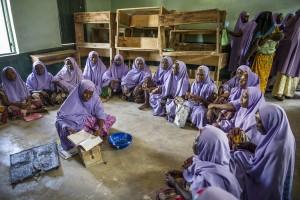
By: Harshi Hettige, AFP
Advance Family Planning (AFP) has partnered with two organizations; Pathfinder Nigeria and Planned Parenthood Federation of Nigeria (PPFN), to expand contraceptive method mix through evidence-based advocacy at the sub-national level.
Pathfinder Nigeria and PPFN will jointly convene a working meeting of family planning innovators, technical experts, and champions to share experiences and work together to improve and expand family planning programs at the state and national levels. The meeting, modeled after the successful Accelerating Contraceptive Choice (ACC) meeting in East Africa, will help to identify the most promising, feasible, and sustainable models and opportunities for scale up.
The meeting will be held in Nigeria in early 2015.
Responding to Stagnation, Learning from Progress
The last decade has seen tremendous increases in both funding and visibility for family planning programs in Nigeria. Despite this, the uptake of modern contraceptives has remained unchanged, with both the 2008 and 2013 Demographic and Health Surveys showing a modern contraceptive prevalence rate (mCPR) of 10%.
At the subnational level, the picture is mixed. There have been considerable increases in mCPR in some states but not in others. For instance, Kwara, Kaduna, Osun, and Ekiti states have all had increases in mCPR over the period, while Lagos, typically considered one of the better performing states, recorded a reduction in the same period.
Although many factors may be responsible for this trend, donor-driven projects, coupled with government buy-in for an enabling environment, has accelerated progress in some states. An increasing number of projects are “pushing the envelope” in developing and demonstrating innovative approaches to making quality family planning services available. For instance, there are more innovative program designs that encompass integrated community-health facility service delivery models, and more organizations and coalitions are lending their voices to advocate for improved family planning.
Consequently, there is a wealth of experience about what has worked in different programming contexts to take to scale.
The Nigerian ACC meeting will build on progress made at the recent 3rd Nigeria Family Planning Conference (November 26-28, 2014), organized by the Association for the Advancement of Family Planning in collaboration with the Federal Ministry of Health and other stakeholders. In addition to a show of high-level commitment to family planning from the government, civil society, and international aid agencies, a key highlight of the Conference was the launch of three national reproductive health policy documents: the Nigeria Family Planning Blue Print; the National Long Acting Reversible Contraceptive (LARC) Strategy; and the Global Programme to Enhance Reproductive Health Commodity Security (GPRHCS) Survey Report.
For more information about the Nigerian ACC meeting, contact: FJega@pathfinder.org.

